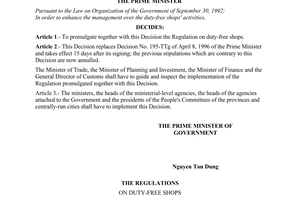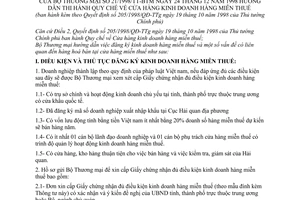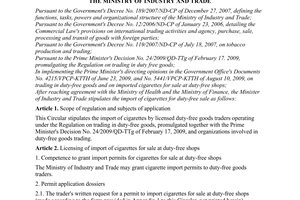Circular No. 21/1998/TT-BTM of December 24, 1998 guiding the implementation of the regulation on duty-free shops issued together with Decision No. 205/1998/QD-TTG of October 19, 1998 of The Prime Minister đã được thay thế bởi Circular No. 02/2010/TT-BCT of January 14, 2010, stipulating the import of cigarettes for duty-free sale và được áp dụng kể từ ngày 28/02/2010.
Nội dung toàn văn Circular No. 21/1998/TT-BTM of December 24, 1998 guiding the implementation of the regulation on duty-free shops issued together with Decision No. 205/1998/QD-TTG of October 19, 1998 of The Prime Minister
|
THE MINISTRY OF TRADE |
SOCIALIST
REPUBLIC OF VIET NAM |
|
Hanoi, December 24, 1998 |
CIRCULAR
GUIDING THE IMPLEMENTATION OF THE REGULATION ON DUTY-FREE SHOPS ISSUED TOGETHER WITH DECISION No. 205/1998/QD-TTg OF OCTOBER 19, 1998 OF THE PRIME MINISTER
Pursuant
to Article 2 of Decision No.205/1998/QD-TTg of October 19, 1998 of the Prime
Minister issuing the Regulation on Duty-Free Shops;
The Ministry of Trade hereby provides the following guidance on duty-free goods
trading registration and a number of matters related to the goods sold at
duty-free shops:
I. CONDITIONS AND PROCEDURES FOR DUTY-FREE GOODS TRADING REGISTRATION:
1. Enterprises established under Vietnam law, which fully meet the following conditions shall be considered and granted the certificate of duty-free goods trading qualification by the Ministry of Trade:
1.1. Its head office is located and its business activities are principally conducted in a province or centrally-run city having an international border-gate;
1.2. It has registered the export and/or import enterprise's code number at the local customs department;
1.3. Its working capital in Vietnamese currency is equal to at least 20% of its estimated annual duty-free goods sale turnover;
1.4. At least one of its leading officials and one official in charge of duty-free shop(s) are capable of managing duty-free shop(s) are capable of managing duty-free goods trading activities;
1.5. It has shops and warehouses convenient for sale of goods and for the inspection and supervision by customs authorities.
2. Each dossier to be submitted to the Ministry of Trade to apply for the certificate of duty-free goods trading qualification comprises:
2.1. An application for certificate of duty-free goods trading qualification with certification and recommendation by the People's Committee of the province or centrally-run city or managing branch or ministry;
2.2. Valid copies of the business registration certificate and of the certificate of registration of export and/or import enterprise's cod number;
2.3. The General Department of Customs' document certifying that the location of duty-free shop and warehouse satisfies the requirements of inspection and supervision by customs authorities.
3. Within 15 days after receiving the complete and valid dossier, the Ministry of Trade shall grant certificate of duty-free goods trading qualification or notify in writing the reason for refusal to grant.
4. The application for certificates of duty-free goods trading qualification to foreign-invested shops shall comply with the Law on Foreign Investment in Vietnam and the guidance of the Ministry of Planning and Investment.
5. The opening of duty-free shops in service of passengers on entry, downtown duty-free shops in service of persons awaiting departures and duty-free shops in service of diplomats shall be decided by the Prime Minister at the proposal of the People's Committees of the Provinces and centrally-run cities or the concerned ministries and branches.
II. GOODS SOLD AT DUTY-FREE SHOPS:
1. It is prohibited to trade at duty-free shops goods items banned by the State from export and/or import (except cigars and cigarettes).
2. The following goods items can be sold at the duty-free shops only after obtaining permits from the Ministry of Trade:
2.1. Cigars and cigarettes.
2.2. Goods subject to conditional export and/or import.
3. The goods items other than those specified in Clauses 2.1 and 2.2, which are on the list of goods registered for duty-free sale as stipulated in the certificates of duty-free goods trading qualification, shall be sold at the duty-free shops under the General Departments of Customs' guidance.
4. Particularly, the export and/or import of goods to be sold at the foreign-invested duty-free shops shall comply with the permits granted by the Ministry of Trade.
5. Each dossier to be submitted to the Ministry of Trade to apply for the goods export/import permit comprises:
5.1 An official dispatch of the enterprise asking the Ministry of Trade for export/import permit to conduct duty-free goods sale and clearly stating the goods name(s), quantity and value.
5.2 Certification by the specialized managing ministry (if the goods are subject to specialized management).
5.3 A report on the situation of unsold goods with certification by the local customs department.
III. REGARDING THE RE-EXPORT, DOMESTIC SALE AND DESTRUCTION OF GOODS:
1. Goods which have already been imported according to the Ministry of Trade's written permit for sale at the duty-free shops and left in stock due to their unsaleability and which now need to be re-exported or sold on the domestic market (except cigarettes and cigars) must obtain the Ministry of Trade's permit.
2. A dossier applying for the re-export or domestic sale permit comprises:
2.1. An official dispatch of the concerned enterprise
2.2. The import goods customs declaration of the lot of concerned goods
2.3. A report on the unsaleability of goods with the local Customs Department's certification.
3. For broken, damaged or seriously deteriorating goods or goods with expired use dates, which cannot be sold or are not permitted to be sold for consumption, the concerned enterprise shall have to make records on such state certified by the customs authority's certification and organize the destruction thereof according to the discarded material-destroying process under the customs authority's supervision, then make and send a written report thereon to the Ministry of Trade, the Ministry of Finance and the General Department of Customs instead of a report.
IV. IMPLEMENTATION PROVISIONS:
1. Regarding the organization of duty-free goods sale activities: the eligible subjects and procedures for duty-free goods sale, the prescribed limits of goods purchase, the procedures for goods import and re-export, the financial and accounting regime, etc., shall comply with the Regulation on Duty-Free Shops issued together with Decision No.205/1998/QD-TTg of October 19, 1998 of the Prime Minister and the guiding documents of the Ministry of Finance, the Ministry of Planning and Investment and the General Department of Customs.
2. Within 90 days after the issuance of this Circular, the enterprise which has already been permitted to sell duty-free goods shall apply for a certificate of duty-free goods trading qualification to replace the documents permitting the opening of duty-free shops previously granted by the Ministry of Trade. The dossier shall be submitted to the Ministry of Trade according to Points 2.1, 2.2, Part I of this Circular and together with the enterprise's reports on duty-free goods trading results for the three years 1996, 1997 and 1998.
3. This Circular takes effect 15 days after its issuance.
|
FOR THE MINISTER OF
TRADE |



